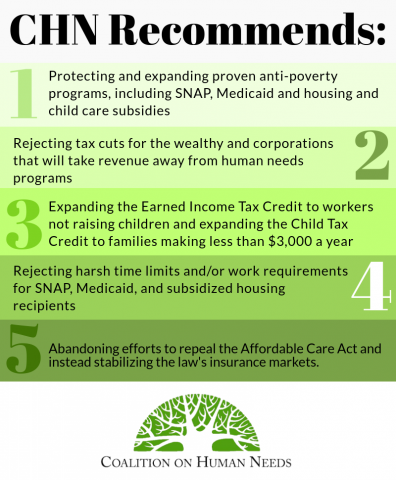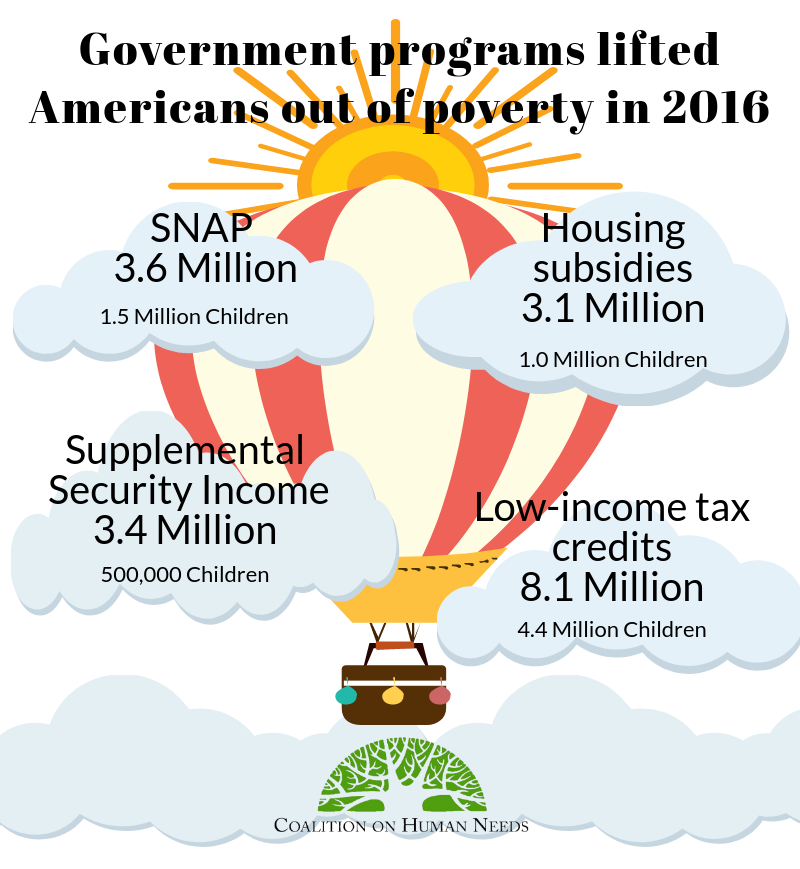
Poverty and Progress: Poverty is down in the US, but new threats are on the horizon
Sustained economic gains and strong federal and state programs have led to welcome progress in the fight against poverty over the last several years. This is good news. But actions from Congress and the Trump administration threaten to weaken the very programs that contribute to this progress.
That’s among the findings of Poverty and Progress: Poverty is Down in the U.S., but New Threats Ahead, a new report released on October 26 by the Coalition on Human Needs (CHN). We encourage you to read the report, use our social media toolkit and infographics to share the report widely (a few sample tweets are at the end of this post), and check out our related state reports and toolkits as well.
Overall, the number of Americans living in poverty dropped to 12.7 percent in 2016, down from 13.5 percent in 2015 and from 14.8 percent in 2014 – overall, a 2.1 percentage point drop nationally from 2014 to 2016. That is the largest two-year decline since 1969. The nation is finally seeing poverty rates return to levels comparable with those before the Great Recession.
However, trouble is looming. The Progress we have made is threatened by proposals from Congress and the Trump administration that would cut programs that have lifted millions out of poverty. The budget passed by the House on Thursday, spending bills from leadership in the House, Senate, and White House, and a proposed giant tax cut for the rich will slash billions from the very programs that have enabled this progress. Such cuts would surely cause millions more Americans to suffer in poverty and near poverty.
Among the report’s findings:
-
- African Americans and Latinos made progress in the fight against poverty. In 2016, 22.0 percent of African Americans and 19.4 percent of Latinos lived in poverty in 2016, down from 2015 and from 2007, showing the U.S. has made progress in reducing poverty among African Americans and Latinos since the onset of the recession. But both communities remain disproportionately affected by poverty – the poverty rate among Non-Hispanic whites in the U.S. in 2016 was much lower, at 8.8 percent.
-
- The U.S. also made progress in lowering the child poverty rate, which was 18.0 percent in 2016, down from 19.7 percent in 2015 and finally at pre-recession levels. But as with adults, African American and Latino children experience poverty at much higher rates than their white peers.
-
- The U.S. also made some progress in the fight against hunger. In 2016, 12.3 percent of U.S. households weren’t always able to provide enough food for all family members, down from 14 percent in 2014 and down from a modern-day high of 14.9 percent in 2011.
Poverty and Progress: Poverty is Down in the U.S., but New Threats Ahead also reported on the extent to which federal programs – many now on the chopping block in Congress – increase income for millions of Americans, lifting them out of poverty while preventing millions more from falling into poverty to begin with.
Examples: More than 8.1 million people were lifted out of poverty by low-income refundable tax credits in 2016; 3.1 million fewer people were poor because of housing subsidies and 3.6 million fewer people were poor because of the Supplemental Nutrition Assistance Program (SNAP/formerly food stamps). Supplemental Security Income (SSI), federal support for people with very limited resources who are elderly or with disabilities, lifted 3.4 million people out of poverty.
But Poverty and Progress: Poverty is Down in the U.S., but New Threats Ahead reports that these are the very programs threatened in Congress and by the Trump administration. The Fiscal Year 2018 budget resolution approved by Congress would cut Medicaid, the Affordable Care Act (ACA), and other health programs by $1.3 trillion over a ten-year period. Medicare would be cut by $473 billion Programs ncluding SNAP/food stamps, Supplemental Security Income Temporary Assistance for Needy Families, unemployment insurance and low-income tax credits would drop by $653 billion. The budget resolution calls for $800 billion in cuts to domestic appropriations, threatening further cuts to housing, education, child care, and substance abuse treatment.
If our elected leaders really want to boost our economy and create jobs and a highly-skilled labor force, they would invest in programs that lift millions of children out of poverty, not cut them. They would invest in programs that allow parents to find and keep good paying jobs, like training programs, scheduling and paid leave protections, and child care. And they would require the wealthy and big corporations to pay their fair share, so we can increase these investments.
You can see our complete report here, then share it widely. Additionally, check out our social media toolkit, which includes sample tweets and Facebook copy. In addition, you can download infographics for use on your favorite social media platforms.
Tweet at your elected officials with the report’s message. You can find your Senators’ twitter handles here and your House representative here – insert those in your tweets.
Here are a few sample tweets to get you started:
US poverty down. But cutting svcs so the rich get tax cuts will end gains. See new report http://bit.ly/2xp1s4G [Insert member of Congress handle]
40.6 million Americans still live in poverty and Congress wants to cut taxes. CHN report: http://bit.ly/2xp1s4G [Insert member of Congress handle]
Poverty down in US. But Congress could reverse our progress. See new CHN report http://bit.ly/2xp1s4G [Insert member of Congress handle]
New report by Coalition on Human Needs shows state of poverty in US. Lots of work remains http://bit.ly/2xp1s4G [Insert member of Congress handle]
This post was originally published on the Coalition on Human Needs' blog, Voices for Human Needs. Receive similar articles in your inbox by subscribing today, and follow CHN on Facebook and Twitter.



The views and opinions expressed in this post are those of the author(s) and do not necessarily reflect those of MomsRising.org.
MomsRising.org strongly encourages our readers to post comments in response to blog posts. We value diversity of opinions and perspectives. Our goals for this space are to be educational, thought-provoking, and respectful. So we actively moderate comments and we reserve the right to edit or remove comments that undermine these goals. Thanks!